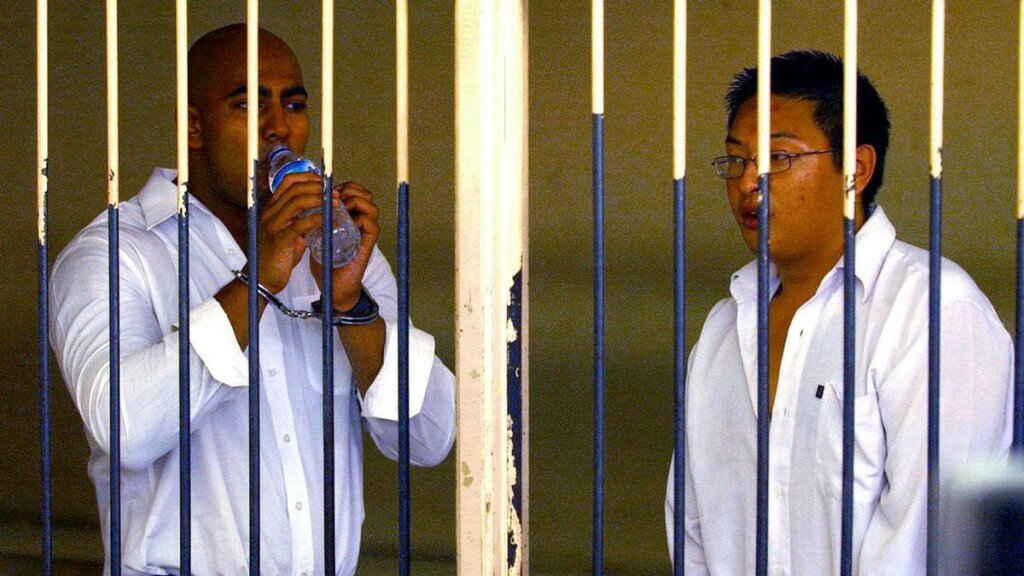Many Australian’s will be disappointed and saddened by the decision of Indonesia’s President Joko Widodo not to grant clemency to Andrew Chan and Myuran Sukumaran despite them being convicted of drug charges under Indonesian law.
The realm of moral relativism is multi-layered and complicated. For a lot of us the idea that someone deserves to die for trafficking drugs offends our notion of justice, however it is important to at least attempt to consider the death penalty from the perspective of Indonesian law.
Under international law, the death penalty may only be imposed for “the most serious crime” which has been interpreted as “serious, violent crime” but not drug related offences. However, in a case brought by Edith Yunita Sianturi, Bali Nine member Scott Rush and others in 2007, the Indonesian Constitutional Court deemed the death penalty constitutional by a majority of six to three.
The majority of judges held that the death penalty for drug offences fell within the meaning of “most serious crime”. In the same decision the Court made a number of significant qualifications to the application of the death penalty, which will be mentioned later.
The issue is then whether the death penalty has achieved lower drug trafficking and use. There are indications that it hasn’t.
The Indonesian legal system is unlike Australia’s in that it uses Civil Law and not a Common Law. In Australia, England, America, Canada, New Zealand and other former British colonies the principle of precedent means that previous cases with similar facts on identical points of law will bind courts of equal or lower status.
Not so in Civil Law jurisdictions. In Indonesia there is little need for extensive law reporting and published sets of judgments are not instructive. This means that any prior decisions of clemency have no influence on the Bali Nine cases.
The death penalty reflects a fundamental difference in philosophical approach to justice. Punishments such as death for transportation of drugs are seen as retributive and the punishment is inherently just and should match the crime.
It is argued that increased rates of domestic drug related crime, sickness and death throughout society justifies the imposition of the death penalty on anyone meddling in narcotics.
The idea of deterrence also comes into play. The hope is that the death penalty for drug trafficking is large enough that people will not engage in illegal activities because the punishment is too high.
As a whole, the death penalty in Indonesia represents the view that crimes that attract the death penalty are crimes committed against the state and therefore the state needs to intervene.
In Australia we would have a few issues with this approach. For one, we find it bureaucratically grotesque for the state to sanction an execution. We would also find it reprehensible for the state to take an ‘eye for an eye’ approach where, for instance, an offender blinded a victim.
Secondly, our criminal law recongises that there are differing levels of criminal culpability so the idea of retributive justice is incompatible with our way of thinking. It should be noted, however, that in Australia, drug offences are treated as crimes of strict-liability where the act of and intention to possess, manufacture or distribute drugs is simultaneously presumed.
Our legal system would also have difficulty in denying evidence that suggested an offender of a serious crime had a lower state of capacity. A court may also introduce mitigating factors at sentencing where the offender has personal and grave circumstance or had altruistic intentions.
On a practical level, Indonesia’s strict punishment of drug traffickers has a lot to do with domestic issues of substance abuse, cartels and geography. A study in ten major cities found four million Indonesians had used illegal drugs, and the country’s drug trade was valued at nearly US$4 billion a year, with drugs readily available in schools, karaoke lounges, bars, cafes, nightclubs and in remote villages. Every year more than 15,000 deaths are attributed to drug abuse.
Indonesian drug syndicates are not only nationwide but also international. Based on findings reported by the Indonesia Media Monitoring Centre, 49% of syndicates are international while the rest are nationwide. Of the international syndicates, Malaysia is the biggest country of origin for drugs at 44% and Australia is second at 13%. Smuggled drugs arrive to Indonesia through the air and sea at 40% and 27% respectively so it is no wander the government and judiciary has responded by ending the moratorium on death sentences.
The issue is then whether the death penalty has achieved lower drug trafficking and use. There are indications that it hasn’t. The modus operandi of drug syndicates is to find desperate people willing to be drug mules for a relatively small amount of money considering the extreme risk of getting caught. The policy is a wide net and unfortunately does not catch the big ringleaders at the top because they are not the ones trafficking the drugs.
In Jakarta there have been published accounts of drug raids on nightclubs and bars but the big dealers usually bribe their way out. Likewise the courts have been known to be open to bribery. With such a porous justice system it is difficult to see why a blunt and unreliable instrument such as the death penalty is still in place.
Perhaps the biggest context in which the Indonesian President’s decision was made is politics. President Widodo came to power on a platform of economic, institutional and human rights reform. For the President to grant clemency over a judicial decision would mean interfering in the judicial process and not respecting the rule of law.
Additionally, the death penalty applies to Indonesians who travel to countries who have the death penalty. In 2010, Indonesia had more than 220 citizens facing execution in Saudi Arabia, the Middle East, Malaysia, China and Vietnam so interference by President Widodo would be a double standard and offend Indonesian’s deep sense of national pride.
Despite all this there is a shared sense that state sanctioned executions are wrong, or at the very least not the right and most effective way of treating drug offenders. The majority judgment in the 2007 constitutional case mentioned earlier shows that attitudes of the Indonesian judiciary are moving away from the death penalty as a primary form of punishment.
The recommendations made were contrary to the justifications given for the President’s decision. The majority did not accept that the death penalty acted as a deterrent any more than life imprisonment; that the death penalty should not be a primary form of punishment; and, that courts should be able to impose a prohibition period of 10 years so that if “the prisoner shows good behaviour, it can be amended to a lifelong sentence or imprisonment for 20 years”.
While the death penalty reflects a different notion of justice and is legal under Indonesian law, there are serious questions regarding its effectiveness and its morality in the modern world. These changes cannot come soon enough.

















No Comments